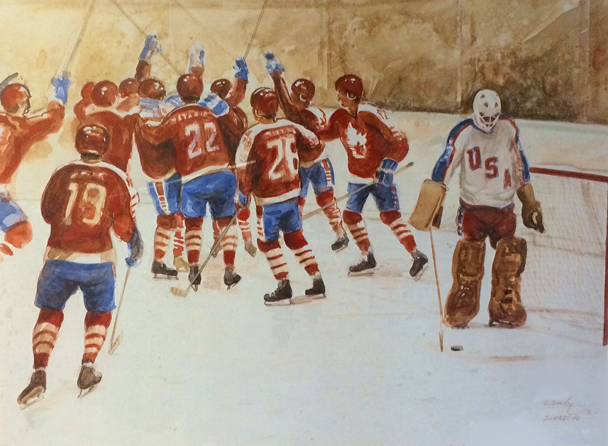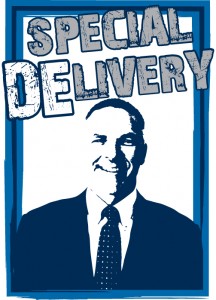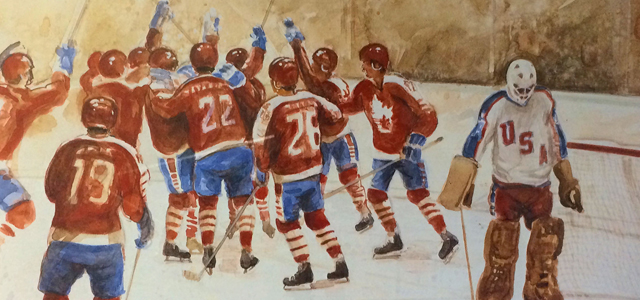Eliot: Reflecting on my own Olympic experience, and how today’s Games have changed


By Darren Eliot –
After competing in the 1984 Winter Olympic Games in Sarajevo, Yugoslavia, as a member of Team Canada, I made USA Today‘s quote of the day by commenting on the notion of pro hockey players participating in the Olympics. In 30 years, a lot has changed – not the least of which is there is no longer a Yugoslavia and NHL stars now dominate the Games. My old opinion and published quote have vanished. Back then, I had just traveled the world for six months and been a part of the Olympic experience. My frame of reference was that the amateur athlete and the Olympic ideal were one and the same, even if the Soviet Union and Czechoslovakia sent amateurs in name only. We in the United States and Canada were above that. Our nobler notion alone made us better…medal counts be damned.
I know, I know. How quaint. Sounds like the rationale of a guy who was one year removed from college graduation – which I was. What my view way back in the day failed to acknowledge was that the Olympic stage in that format didn’t have all the best athletes. What I understand now, as Team Canada heads to Sochi, Russia to defend its gold medal status, is that having the best engaged in the proceedings brings greater visibility to the Games in total and hockey specifically. It’s no longer a four-year curiosity of niche sports performed by – in hockey’s case in North America – obscure college and junior players.
Now, it’s wall-to-wall coverage, with Team USA’s roster announcement staged at the Winter Classic – an event within an event. Same thing in Russia, the Czech Republic, Finland and Sweden. With the 2014 Games in Sochi, there is a heightened scrutiny on not just Team Canada, but the host team as well. For the gold medal incumbents: Will Sidney Crosby flourish as the captain? Did Steve Yzerman, as head of Team Canada’s effort, get the right mix of talent again, or did they err in leaving off certain players – namely his Captain in Tampa, Marty St. Louis? For Russia, will Pavel Datsyuk, as captain, lead the locals to gold and make Russia proud on the world stage – politics and security threats notwithstanding?
It is all compelling stuff made so because the names involved are all NHL stars. True, in today’s best-is-best scenario, the 1980 “Miracle on Ice” victory and eventual gold medal won by Team USA isn’t possible. But, the trade-off is a different type of competitive unpredictability — one in which any number of teams have a chance to win because every entry sends its most effective group of athletes. Witness the last four Olympiads with three different winners — the Czech Republic in 1998, Canada in 2002, and Sweden in 2006 and Canada again in 2010.
So, all these years later, I’m not nostalgic. I get it. The Olympics are reserved for the best, not the best available who haven’t yet turned pro. Besides, the World Junior Championship has grown and filled the void nicely for the best hockey players who are still in junior and college. But, my Olympic experience of 1984, proudly wearing the Maple Leaf crest worldwide, was very different from what today’s NHL stars experience.
For one thing, we were truly a team. We lived together and our year was all about a commitment that just isn’t possible now unless the NHL wants to shut down for months on end while its best players devote themselves to their respective nations.
On the ice we had a very good group that included numerous players who went on to stellar NHL careers. We were especially strong along the blue line, with James Patrick, Bruce Driver, Doug Lidster and JJ Daignault counted on heavily to defend and move the puck. One defenseman who didn’t make the team was Kevin Dineen — at least not as part of the blue line corps. Head coach Dave King moved him to the wing because of his skating ability and awareness of the defensive side of the game. It was a career change that worked out well, as Dineen went on to be an extremely effective NHL winger.
Up front, we had Dave Gagner, Pat Flatley and Carey Wilson, who excelled with us and then did so at the NHL level. Gagner’s son Sam is now a key cog with the Edmonton Oilers and I hope he has his dad’s work ethic. Dave Gagner always wanted to work on his game after practice. We got into a heated conversation one day when he said I wasn’t working as hard or staying on the ice as long as his goalie in junior, Allan Bester. I had just been diagnosed with Type 1 diabetes and hadn’t told my teammates yet. I was secretly going to the hospital in Calgary between our double ice sessions to learn how to live with it. My personal plight aside, Gagner’s post-practice passion taught me the importance of a goaltender’s work ethic as it impacts the rest of the team.
Travel was a big part of our experience, with stops in Sweden, Germany and the Soviet Union. Playing the Red Army team on their turf in Moscow in the Izvestia Tournament was one of the most surreal moments I’ve ever had. They skated circles around us, as we were as much spectators as competitors. So many men in military uniforms. So much heavy, pungent smoke rising to the rafters as smoking indoors was not the taboo it is today. And the kids. They followed the bus hoping to get anything we would toss their way. I had never seen such joy in receiving a piece of chewing gum. They were curious and so were we.
To Coach King’s credit, along with assistants George Kingston and Jean Perron, getting the most out of our year together was about more than hockey. We went to castles in Germany, the Louvre in Paris, the main market in Moscow, where a couple of guys were detained for taking pictures of the long lines of people waiting to purchase skimpy produce, or coarse, heavy wool sweaters. No honeydew melon or Hugo Boss in pre-glasnost Russia. The pair was released after 45 minutes of questioning and agreed to give up their cameras. They did not escape the wrath of Coach King or the razzing of teammates forced to sit on a bus for an hour waiting for their fate to be decided by the KGB.
Even in Sarajevo, King made sure we got to fully appreciate the Games in total. On our off days we would attend other events. Walking in the opening and closing ceremonies was special and Fellini-esque in their own right, but so too was watching Scott Hamilton and Katarina Witt thrill fans at the figure skating venue. I still have a funny photo of me and my goaltending partner, Mario Gosselin, mugging for the camera where the skaters sat and waited for their marks – complete with roses. That’s long before Will Ferrell and Jon Heder came up with the idea.
Gosselin himself had a fine NHL career, especially early on with the Quebec Nordiques. ‘Goose’ was small but oh so acrobatic. He was a character with as fast a glove as anyone I’d seen. We shared the duties all season in preparation for the Olympics, with Mario taking control as the number one as I dealt with my health issue. After practice in early December, King called us into his office. We thought it was going to be a pep talk on how well we’d been playing and not to get frustrated. Instead, King challenged us to be better. He uttered a line I’ve recounted numerous times in working with young goaltenders. King looked at us across his desk and said, “Boys, you’ve been playing well lately…just well enough to lose.”
We were surprised. We had been playing well even though the team was struggling to score at times. King knew, though, that to compete against the big teams of the Soviet Union and Czechoslovakia and to beat the Americans to open the Olympics, the goaltending couldn’t be merely good. It had to be great. Gosselin responded to the challenge and played sensationally, getting us to the Bronze medal game versus Sweden. In that game, Flatley was jawing at the official as he skated back into our zone and the next thing we knew, the referee was on the ice. Flatley was assessed a major penalty, with our locker room nothing but between the second and third periods. King was looking for an explanation and Flatley was professing his innocence. Sweden scored early in the third with the advantage and won, 2-0.
As unceremoniously as our Olympic Games ended, they began in glorious fashion with Wilson netting a hat trick in a 4-2 win over the USA. That team featured Chris Chelios, Pat LaFontaine, Eddie Olczyk and Al Iafrate. They were under so much pressure coming into that first game — pressure akin to what Team Canada faced as the host nation in 2010 — as they were following the 1980 Miracle on Ice team. Their bus got stuck in traffic and they were late getting to the game, barely making warm-up. Team USA never recovered, failing to make it to the medal round in the old pool play format.
All these years later, I consider myself truly fortunate, even as the scope and magnitude of hockey in the Olympics has grown exponentially. That’s the point now – giving fans the best players and the game more cachet. Yes, finishing fourth back in 1984 stung, but the NHL Olympians of today don’t get to share the same camaraderie and experiences that my teammates and I did. The current Olympic Teams have just a few days to sort themselves out once the NHL schedule goes on hiatus Feb. 8. The players will fly halfway around the globe, convening for a practice or two before the Olympic tournament starts in Sochi.
It’s all about big business and winning now, but my experiences alone were worth their weight in gold, renewed every four years when the Games commence.
Great memories for me. Great hockey for us all.

